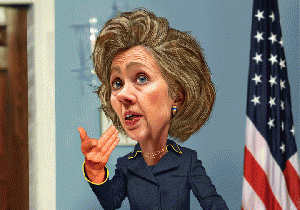
Hillary Clinton - Caricature4
(Image by (From Wikimedia) DonkeyHotey, Author: DonkeyHotey) Details Source DMCA
One of the most important primary elections in history may be determined by the rules applying to delegates at the Democratic National Convention. These rules should be fixed by federal law governing the run-off election process to determine who gets ballot access in the general election. But instead, much of that process has been delegated to the political parties to determine for themselves. The parties became more corrupt in this election than in any previous election, after Obama signed into law the 2014 CRomnibus Appropriations Bill that increased by ten times the contributions that plutocrats can make to political parties. Unsurprisingly, the DNC's rules favor those plutocrats who pay the bill. These DNC rules must be changed as part of the reform that Bernie Sanders has promised to get money out of politics. If Sanders cannot reform the DNC it is unlikely he will be able to reform Congress.
The
Clinton "victory" is a congeries of "rotten boroughs,"
conflicted Superdelegates, exclusionary primaries, and
disinformation. If the run-off process were conducted in a
democratic manner, these devices would all be barred by Democratic
National Committee (DNC) rules.
Hillary
Clinton is piecing together a superficially successful campaign on
the basis of rotten boroughs -- as
of "Super Saturday, all former slave states --
where it is certain that there will not be a single electoral vote
cast for a Democrat or for any party which represents a progressive and
diverse electorate. Clinton also depends upon Superdelegates who
have conflicts of interest because they have worked for, received
money from, or are otherwise integrated into the systemic legalized
corruption of the Clinton political machine .
Clinton has been further aided by obvious disinformation
about her electability and experience, not to mention her fake
status as a civil rights hero, as well as other features of a broken
presidential run-off system. The money-stream media labels this
money-bag of DNC tricks "victory."
Sanders' campaign has committed itself, as a consolation prize in case it fails to secure his nomination, to make some rules changes at the Convention. Changing the DNC rules should be an integral part of the campaign and a condition of the participation of Sanders' delegates in the Democratic Convention. Adoption by the DNC of fair rules for nominating a presidential candidate would be an alternative to a Philadelphia replay of 1968 by Millennials saddled with so much debt they were practically born in default and outlawed by a financialized state.
Michael
Moore cheerily predicts
"that the person who is most popular will win the contest." But
Moore's political predictions are often wrong
or self-contradictory.
Without democratizing the DNC's plutocratic rules it is possible
that, as intended, the most plutocratic not the most popular
candidate will win. Changes in the rules could determine the
Democratic nominee by relegating Clinton's "victories" back to
the plutocratic mire where they originate.
Similarly
historic rules changes as those enumerated below were made in 1972 as
a result of the 1968 rejection of a boss-ridden Democratic Party.
The 1972 reforms were significant. They led to Carter's outsider
victory in 1976. They make possible the credible 2016 run that Sanders is
making as the most popular candidate in either party. But they
remain incomplete and and were even reversed when Superdelegates were
created
to let the boss-system back in the door, starting in 1984. The
excuse was to prevent another suicidal challenge to a sitting
president like Kennedy waged in 1980. But Superdelegates enable
Clintons as the new boss. Just like the old boss, "Hillary
has billionaires galore in her corner."
The current state-based national run-off system for selecting a president is a hodgepodge of procedures that run the gamut from fair and democratic in some states, like Minnesota which prides itself on clean elections and high turnouts, to easily corruptible and exclusionary in states with low-turnout and unrepresentative results.
A
state like Minnesota uses exclusively paper ballots, hand counted by
neighbors at the precinct level. There was no room in Minnesota's
process for the statistically troubling expert analysis
of Massachusetts' precincts that "indicate fraud." Unadjusted
exit polls suggest an 8.6% discrepancy while "cumulative
town/precinct" data support a far greater discrepancy between
Sanders winning comfortably, as one would expect on the basis of the other four blue
state results, and the machine-counted tally to the contrary. With
Massachusetts a must-win for the Clintons, it looks like with Bill on
the scene,
they did.
Rule
changes at the level of the DNC could correct or compensate for the
lack of minimal national run-off election standards. Several
systemic flaws could be removed by changing Convention rules that are
currently designed to tilt the results toward plutocracy, which in 2016 means
to Clinton and her "billionaires galore."
Public demand for reform of DNC rules starting right now could draw attention to several of the most egregious methods by which plutocrats manipulate a venal party. Failure to change the rules may result in the nomination of the least favored and least likely to succeed among two candidates, when the other of those two candidates has gained favor among the general electorate by credibly resolving to overthrow plutocracy.
1. Rotten Boroughs
Next Page 1 | 2 | 3 | 4 | 5 | 6
(Note: You can view every article as one long page if you sign up as an Advocate Member, or higher).




